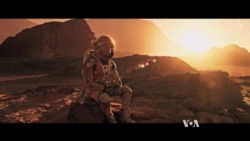Ridley Scott's new movie The Martian isn't as faithful to Andy Weir's bestselling novel as it is to the science that underpins the book.
It's hard to find any other science-fiction film that has stuck so faithfully to the practival challenges of living and surviving in space since Ron Howard's "Apollo 13."
The film manages to create a cinematic experience, and a riveting plot based on the idea that man can survive on Mars as long as he’s done the math.
It sounds dry, but Ridley Scott pulls it off with majesty.
WATCH: The Martian movie trailer
Story line
During a month-long mission on Mars, the five-man crew of Ares 3 encounters a megastorm they didn't plan for, and the team is called home. The craft's commander in-chief Mellisa Lewis orders an emergency evacuation. In the process, Mark Watney, one of the five crew members gets impaled by a flying communications antenna. Lost in the storm his fellow crewmen leave him behind for dead.
NASA chief Teddy Sanders, played by Jeff Daniels, announces Mark Watney's death to the media. His fellow crewmen and guilt-ridden commander mourn his loss; the only problem is that Watney is very much alive. But the question is: for how long?
Based on the food and water the crew left behind, Watney figures he has supplies for 31 days, and unfortunately, thanks to the storm he has no way to make contact with NASA ground control.
But the movie, which is a celebration of human ingenuity, makes this just another challenge for Watney, an ingenious, scientist specializing in botany. The determined loner simply decides to survive and hatches a plan to grow food and water on a barren, dusty planet where nothing grows.
Meanwhile he is working on establishing alternative methods of communication with Earth. When he finally reaches NASA, and a rescue plan is hatched news still remain bleak. He has to survive a whole year before help arrives.
On the red planet, things can go wrong at any moment and they do.
Ridley Scott
Sci-fi iconic filmmaker Ridley Scott says no other science-fiction film has gotten science so accurately down as The Martian.
“It is near fact as it could possibly be. So the challenges are reality not fantasy. There is nothing in there that you can’t do, " he said. "There is nothing in there that he uses that isn’t already on Mars.”
Like a post-modern Robinson Crusoe, Watney uses his ingenuity and intellect to survive. Matt Damon interprets Watney, an astronaut trained to use science as his compass and a individual exemplifying human resilience.
When things go bad Watney uses gallows humor to overcome despair. When loneliness strikes he talks to a computer, building an electronic log for posterity and when his resources get destroyed and hope is diminished he simply gets back to to work.
Jim Green, Director of Planetary Division at NASA, offered Scott advice about the terrain and look of Mars for the film's visuals. Green says movies like "The Martian" inspire us to go a step further in space exploration.
The fact that “science fiction and what happens in films, can allow us to dream is an important element of our country," he said. "It’s an important part of what we do. Allowing us to dream and think about the future, enables us to live towards it to constantly move to those directions."
"What I really like about the film," he added, "is indeed about human exploration on Mars, not in the distant past but in the very near future. In the 2030s we are going to be visiting Mars, humans will be flying by Mars in ways, and in the 2040s and 2050s, is when the president wants us to get boots down on the ground. So this is a normal progression. It is right around the corner, and it’s a vision that allows us to aspire to."
Green, recently announced that scientists found liquid water on Mars and that the discovery may bring the promise of human colonization of the red planet even closer.
The announcement, a few days before the film's release is coincidental and he said, science continues to march on because as in Mark Watney’s story, continuous exploration and survival are " in our DNA."








